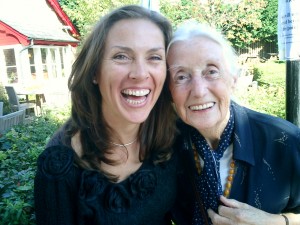Written by
jaron summers (c) 2006
Bill Meilen told me that the difference between a wedding and a funeral in Wales is one less drunk.
At the time he was gravely ill but even so his humor did not fail him.
Days later on September 4, 2006, Bill, 73, died. My wife, Kate, and I attended his funeral in downtown Vancouver, BC, where he and his wife, Patricia, had made their home for the last decade. His service in Christ Church Cathedral was one of the most beautiful we had seen.
Begun in 1888, the cathedral’s sandstone walls are resplendent with stained glass images. If colored crystal could speak, the cathedral would have sung “The Hallelujah Chorus.”
Christ Church Cathedral
Bill dubbed the nave’s acoustics “astonishing” and performed Shakespeare beneath its soaring cedar ceiling to the delight of locals.
Bill’s final request was to be buried in his birthplace, Cardiff, Wales. In a day of heightened airport security and terrorism it seemed that such a task would be both arduous and expensive.
His wife said she would honor his wishes and return Bill’s body to his beloved Cardiff where internment would follow a second funeral. I asked Pat what she thought of us going to Wales. She said she would appreciate it.
Bill — poet, writer, actor and teacher — penned Final Voyage after his father died in 1991.
Final Voyage
Today my old Dad signed Ship’s Articles
For a voyage to the end of Time.
I see her in the mists of mind –
The ship that’s come to call for him.
A tall five-masted barque with an angel’s wings
Spreading from her bowsprit.
In mist she lies at jetty’s end
Her crew of old shipmates standing by
And his Nancy waiting laughing by the shore
All ready for the run together
Under the sheeting shroudsails
Bellied in the full final wind
To pull them to the higher latitudes.
I think I know somehow
Where they’ll be heading –
Wishing them landfall
On that far happy shore.
As our jet descends over the British Isles at London’s Heathrow airport at six AM after a bumpy Atlantic crossing, I think of Final Voyage.
My wife and I are in Great Britain because we want to say goodbye, a final sendoff to an old colleague, but I am also trying to understand why one of my best friends, who had spent only the beginning of his life in Wales, was so keen to be buried in its soil, a soil steeped in tales of coal miners, Druids, and King Arthur legends.
London, about 150 miles from Bill’s birthplace, shimmers in the pre-dawn. The steep slate rooftops and chimneys remind me of Mary Poppins. I recall Bill’s renditions of “A spoonful of sugar makes the medicine go down.”
Bill had both a photographic memory and a photographic tongue. He seldom forgot a lyric, and never a dialect. Dialects were his specialty when he had been a professor at the University of Alberta.
Although you would have had to have met him to believe it, Bill’s dialect skills far surpassed Henry Higgins of My Fair Lady fame. Bill could concoct any accent — from a befuddled or boisterous Cockney to a drunken Indian — either from the plains of Canada or the sub-continent. Bill could mimic a sober Indian, a puzzled Indian, an intellectual Indian. And not just Indians — any nationality from Japanese to German to Brazilian. He went far past mimicry, he assumed the mantle of the person he was imitating.
In the decades I knew Bill I saw him interact with hundreds of people. It never took him long to discover their roots and he would inevitably sing the national anthem of their country. The anthem was delivered in near-perfect pitch, a cappella, in the person’s own language.
After, the recipient would usually ask if Bill was also a native and Bill would say no, I was there for the Coronation of your King or while I was working for — well, I can’t say right now, it had something to do with security at the highest level. And then with the flair for intrigue and mystery tempered by hundreds of performances on stage, TV and radio, Bill would talk about the national flower of the country that his new acquaintance was from. He always left people wanting more.
Bill possessed an uncanny gift of dashing off a dozen stanzas about the life of someone he had just met. He wrote by hand in impeccable script and then he would read it to the recipient who was inevitably honored and astonished by the compact Welshman.
Kate and I along with six or seven hundred incoming passengers from various flights trudge to the immigration hall at Heathrow. The hall is humid, congested and chilly as weary travelers plod along serpentine lines.
A story Bill told me from the days of Dickens. The poor were perishing on the streets in the cold and foggy London nights so the city fathers erected long sheds to house the unfortunates. Alas, there was no room to sleep. Too many people and not enough space to lie down.
The solution: string ropes between the walls of the sheds. This way the poor could sleep standing up. Quite simple. Just drape your arms over the ropes and nod off. At daybreak the human clotheslines were severed and the unfortunates collapsed and instantly woke up — to return to the streets to collect additional handouts from the kindly city fathers.
As I watch my fellow travelers stumble through the immigration halls, the image comes to mind of weary voyagers who had just had the ropes yanked from under them.
I am not sure if such “sleeping sheds” and “slumber ropes” existed in Dickens days. Perhaps Bill had made up the story and like most Meilen tales, the English did not come off well. Bill forgave them for the despicable ways they behaved toward the Welsh over the centuries but he still liked to “send them up.”
The truth is the English looked down at the Welsh. This may have been one reason Bill identified with and bonded with the underdog (and undergraduate) during his peculiar but always fascinating life.
Kate and I catch a fast and efficient train to Paddington Station, located in southwest London. The train makes no stops and takes only 15 minutes.
At Paddington we buy a ticket to Cardiff. It is the weekend and there is a special 10 pound upgrade. For that you go first class with free coffee, tea, water and biscuits.
We more or less have the first class coach to ourselves. Three hours to Cardiff. The elegant countryside flashes by. Industrial areas morph to great stands of green fields and gentle blue skies. Blackberry bushes, heavy with fruit.
It is a perfect autumn day and I can see why Bill longed for this country. I am still not certain why he would put his wife through the expense and what must be a tremendous hassle of returning his body to native soil.
I knew many actors in different parts of the world and when they were stumped with a dialect I would recommend Bill. In a ten minute phone call with the Wizard from Wales, an actor would learn exactly how to pull off any dialect. It didn’t matter if you needed to be an Australian entrepreneur or a Zambian dog catcher. Bill always delivered and provided a dozen anecdotes.
My thoughts are interrupted by a man from Nigeria. He has messages from God and, expounding on the Bible, raves why he is right. Non-believers are those who do not fall into line with his take on his version of the Bible. I ask him how he could be right and everyone else wrong — this activates an outburst on Armageddon and how delightful that will be for those special souls who follow his teachings.
Bill would have sung the man the national anthem of Nigeria, spoken to him about the early Africans and their contribution to mankind and agreed with the self-styled minister about his religion, going so far as to quote ancient holy scripture that predated the King James Bible.
Within twenty miles, they would have been drinking together and by the time the train pulled into Cardiff, Bill would be an honorary member of the minister’s congregation and invited to speak at its next assembly.
But Bill is not here. His body is already in Cardiff, awaiting burial the next day. Kate manages to change the subject with the man of God by inquiring about a nearby body of water. It turns out the water was actually a dam. The need for power and energy in what appears to be a thriving Wales is evident from the many high power tension wires flashing past.
Faster and faster zip the power poles. They remind me of the hourglass Bill kept at his desk when his two girls were toddlers. When the girls asked him about time Bill would turn the hourglass upside down and tell them to watch. “See how the sand tumbles faster when there’s not much left? That’s how time is.”
Wales has, like so many parts of the world, burst into the 21st century, changing from an agricultural to a manufacturing and business based economy.
Since the time of Christ, Wales has been known for coal. A century ago the country provided one third of the world’s coal exports, a quarter million men mucked it. The black dust not tattooed in their faces gurgled in their lungs and if you want to savor heartbreak, read How Green Was My Valley. Humankind’s never-ending quest for cheap energy.
Today Wales is harvesting wind energy both onshore and offshore. Mid Wales boasts the UK’s most powerful onshore wind farm. It is located in a mountain plateau of Cefn Croes, and features 39 turbines, each as high as 100 meters. This provides 42,000 homes with electricity and is twenty percent of all onshore wind power in Wales.
The locals complain about noise and grouse that the turbines ruin the view. Plans are afoot to set up off-shore turbines, anchored several miles out at sea. Plans are also afoot to stop them since each of the turbines will be taller than the Statue of Liberty and locals fear the power generators will ruin the panorama.
When we arrive at Cardiff Station, Kate discovers that the locals speak two languages — English and Welsh, neither one of which she can understand. (Having been born in Canada and around many Welsh, I can follow the English fine. Well, almost.)
Oh, to have Bill’s ability with language. One of the saddest aspects of a friend’s death is that an extension of you disappears. If Bill were only with us, then we would have had no trouble communicating for Bill was a Power of Babel.
He could make himself understood by almost anyone — the interpreter that you could always count on. What a Wales he would reveal to us and how he would delight in such a tour. I hope, as we walk the streets that he loved so much, that we will see Bill’s Wales through the eyes of those who loved him.
Bill’s sister-in-law, Lorena, has recommended The New House Country Hotel near Bill’s services.
It is a twenty minute cab trip, past the crumbling and ancient Cardiff Castle, mushrooming high rises and sleek office buildings. Cardiff is an old city and the Welsh language one of the oldest tongues on the planet.
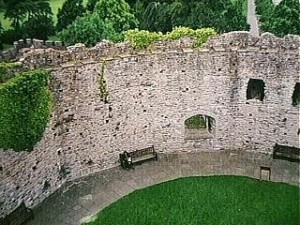
The Castle is on its last legs and has been tottering for decades. It was originally a Roman outpost in the first century, and since then various architects have had a whack at it. William the Conqueror moved in and added a few bricks a thousand years ago.
Some architects claim that it’s not really a castle. It seems that in the 19th century the exterior of the castle was redone to make it look like it was from the Middle Ages. This was to attract tourists. Later the locals borrowed some of the bricks to make homes.
Bill told me that “the Welsh wouldn’t dream of stealing a national treasure but they wouldn’t be above shifting bits of brick.”
It turns out the New House Country Hotel is not that new. The old house? It burned down in the middle of the 18th century. Bill always insisted the Welsh had a skewed perspective of time.
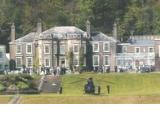
We arrive in early afternoon to view a crayon-colored fall day that looked like Monet has been at work. In the distance I spot the docks where Billy played and as a teenager gone to sea with his father, a merchant marine.
A woman of about 50 whirls in. Attired in riding boots, the grand dame plops into a window chair, babbles on her cell phone in Oxford English.
Seems her husband is recovering from a hunting accident but that is not going to dissuade her from a week-long cruise. Hubby can have his mistress administer to him. Why don’t the two go hunting together? Ha-ha.
She devours a sandwich, glances out at the darkening sea and instructs her fellow diners to look at the beauty of it all, then uses the prongs of a fork to clean her teeth behind a lace handkerchief.
More than once, Bill regaled me with the characters that people Cardiff. “Quite harmless,” he had said. “But fodder for stories.” Many of those characters ended up in the dozen novels he wrote.
Kate and I don’t sleep much our first night because of the change in time zones.
At 4 AM I go down to the lobby to work on my laptop. I meet Henry, the night clerk. He tells me the only way he can afford to smoke is to roll his own. Store bought cigarettes are more than five pounds a pack. Henry has been a night clerk for years and likes the quiet.
He has a son in Iraq whom he worries about. “We don’t have any problems here with Moslems,” he says. “There’s a lot of them in Cardiff. They like living here.”
He offers me one of his home-wound cigarettes and I decline. I think about Bill, he was a two- or three-pack a day man. That’s what ruined his lungs and hastened his death.
Kate and I watch the sunrise. In a few hours it will be time for Bill’s second funeral.
We walk along a well-worn footpath to the home of Bill’s brother.
John Mudd is in his early 60s and lives with his wife, Lorena, in a cozy home with a backyard in the midst of reconstruction. Now that their two children have moved out, Lorena is planning on making their daughter’s room into a wardrobe. The downstairs features a kitchen for someone who loves to cook, a sitting room and dining room. The Mudds are well on the way to extending the kitchen area into the back yard to make a breakfast nook.
Lorena is Italian. John is of course Welsh. He is a compulsive eater. She, a compulsive feeder. It’s a perfect union and the best place in Wales to have a meal if you’re lucky enough to be invited. (And those silly historians thought that the Welsh had vanquished the Romans.)
You might wonder why Bill called himself Meilen instead of Mudd. He told me he liked the sound of Meilen better than Mudd. There was another reason. Bill had joined the French Foreign Legion and when he saw they were committing atrocities he deserted. He worried that they would execute him if they caught him. So he changed his name to that of a town in Switzerland that he drove through.
Exit Billy Mudd.
Enter Bill Meilen.
John and Lorena’s lives had been overwhelmed by Bill’s death — early that summer John had visited him in Vancouver. Now the Mudd’s home is the gathering spot for relatives and friends who have come for Bill’s services.
The mourners are a microcosm of Welsh society. And as I watch what happens this day I begin to understand why Bill longed to return.
It is the family that counts in Wales. For centuries Welsh society has been forged in a troubled cauldron. The family has endured and with it the spirit of Wales.
Some historians have suggested Wales began with the Druids and Stonehenge, although most modern scholars say there is no connection. Besides, things were happening in Wales before anyone thought of building a circle of huge stones.
Around a quarter of a million years ago there were shaggy human-like inhabitants in Wales. Someone used tools about 30,000 years ago. As far as settlement was concerned things got under way after the last Ice Age, around 10,000 BC. Britain became a series of islands about 7,000 years ago and European adventurers headed for Britain.
They built Stonehenge around 3,000 BC, somehow moving the massive upright stones from the heights of Preseli in Southwest Wales. Today this is still considered a holy place.
2000 BC was the Bronze Age, then a thousand years later the Iron Age. Then came the Druids. The keepers of the ancient language when they were not feasting or horseback riding. They organized religious rituals and prayed to local deities. Any excuse for a banquet. When the English wrested their land back from the Romans they did their best to stamp out the Welsh.
Bill’s grandmother, who delved in witchcraft, triggered his interest in the Druids and Welsh history dealing with the supernatural. There’s a lot of it. Every self-respecting castle has a ghost or two.
This may be why in Welsh society elders are treated with considerable respect and honor. The old ones are the keepers of the light, holders of the secrets, the link to the mythical past. The ancient times bubble with wild legends and doers of heroic deeds.
Bill chose to be buried in a plot in Cathays Cemetery, near the person who raised him, his grandmother. She helped shape his unique perspective and occasional eccentric view of life.
A stately black hearse arrives at the front door. In it is Bill’s coffin. A large Welsh flag covers the coffin. It features the red dragon (y Ddraing Goch) and is both beautiful and spellbinding. On the flag rests bouquets of fresh flowers.
It looks like it will be smooth sailing for the rest of the day. The last week or so has been frantic. Shipping the body. Trying to coordinate so many things. Discovering that the grave was not wide enough, last minute arrangements for diggers who charged a hundred pounds an inch to widen the grave for the oversized coffin.
It is going too well because it seems at every Welsh funeral something goes wrong. Playful spirits have need of fun. An old ghost might make an appearance. Someone reports jubilantly that something has gone wrong. The new grave has a water pipe in it and the casket cannot be lowered correctly. A cousin says that problem will be solved and so it seems that the obligatory kafuffle has been taken care of. We can relax. Or can we?
The funeral procession begins led by a man wearing a top hat that looks like it’s straight out of Alice in Wonderland. It reminds me of an old-fashioned New Orleans funeral, without the jazz. There is a somberness mixed with a resignation of the inevitability of life and death. A touch of magic. And there is a pleasure in being there for the end of a life lived well.
One of Bill’s nieces, Sian, drives us to the nearby Briwnant Chapel in Thornhill for the funeral. Sian frets about her son who is in the car ahead of us. He is not wearing his seat belt. Sian uses sign language to tell him to put it on. He does.
Sian teaches children to sign and her specialty is babies. “By the time a baby is six weeks old he can sign for milk,” she explains, she holds up a hand and makes a motion like milking a cow. “Babies’ vocal cords require a lot longer to develop than their motor skills,” she explains. “It takes a baby about sixteen months to verbally request milk. This is faster.” She tugs at an imaginary teat.
Bill’s second funeral is everything that the first one was and perhaps more. John gives the eulogy and talks about the impact his older brother had on hundreds of people. The final song is a touching rendition of “We’ll Keep a Welcome.” It’s a Welsh ballad, and it seems the perfect requiem for someone home from halfway around the world.
Next stop is Cathays Cemetery. The graveyard is 200 years old with a decaying Gothic cathedral that looks like Edgar Alan Poe was the job foreman.
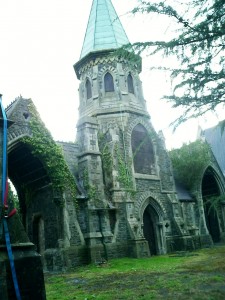
Cathays Cemetery
Bill’s coffin, covered with that brilliant and blazing Welsh flag, is lowered into the ground. Someone has figured out a way to move the water pipes that could have impeded the coffin’s descent. Take that you mischievous poltergeist.
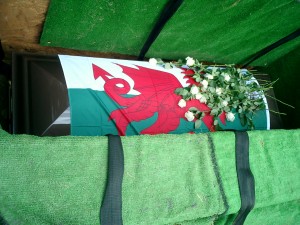
Bill Meilen beneath his Welsh flag
After the other mourners walk away, Bill’s oldest daughter kneels by his grave. She holds a bible. It’s a once in a lifetime photo opportunity but I can’t bring myself to take out my camera and intrude. Doesn’t matter, the image is seared forever in my mind.
Bill’s wake is in one of the hundreds of local pubs that dot the Welsh landscape. About a quarter of the family pub has been set aside for the gathering. Fifty or sixty people show up. Most of the mourners are relatives of Bill, some of whom have not seen him since childhood. The pub has a section for spirits and more than a few mourners get down to serious toasting.
John and Billy, as youngsters, had spoken with the clipped and strident dialect of Cardiff. Bill, who taught himself dialects, convinced John that it would be in his best interest to learn to speak with a proper upper class accent. John was a good pupil and now could pass for an Oxford scholar.
“I suspect that is why I have been relatively successful in business.” He and some of his business colleagues are experts in potato chips (crisps in Europe) production. Their Real Crisps are becoming world famous and he proudly points out that without Bill’s help in learning to speak successfully, there would probably be no factory, a factory that just secured a huge contract to supply potato crisps to Starbucks in Europe.
Nigel (John’s son) is sad that he and his Uncle Bill simply did not spend enough time together, what with being on two sides of the world. “But you know, even if we did not see each other for years, within a second of meeting we were right back on track.”
Both Bill’s daughters, Lisa and Myfanwy are there. They were in Vancouver when Bill died. They gave him massages and talked softly to him and laughed and cried while he slipped away that last month. They have warmth and love and movie star looks. Bill’s death has hit them the hardest. They talk about the good times and the legacy Bill gave them. How he taught them about life, how he infused them with a love of literature. Here is a poem that Bill wrote for Myfanwy when she was a toddler.
Myfanwy Child, 1970
Every toy, every pile of leaves
Each scratch of forest floor
Becomes the most important gesture in the world
For the fleeing second of her concentration
Now she puts a stick into the fire
Marvelling at the wonder of smoke
And some moss and soon a woodland flower
Holds her attention with their symmetries.
Then off she runs and finds a dragonfly
At the end of its brief summer, dry
As sticks that stand beside the fire.
And here are young and age in one
The child upon the threshold of a life
The insect with its vital span fulfilled.
And when I see her eyes that’s the way we go
One moment fresh and young
The next a passing memory of the tongue
Of someone who continues on the road.
The wake continues. Tears and hugs and laughter as knots of people recount some of the highlights of Bill’s life.
In all the stories the common thread (or would it be common yarns?) is a man who was compassionate and caring, who went the extra mile for family, friend, student and as often as not, the stranger — the underdog.
Bill always wrote a four or five page letter to each of his students at the end of their semester. The letter was packed full of congratulations, hope and suggestions for the recipient’s life.
Storytelling turns to singing. Myfanwy and Aunty Doris do a duet. Aunty Doris is old and tiny and possesses a spirit that Cardiff cannot contain. She seems more amused by death than fearful of it.
Lisa tells me that she was with an uncle when he died. “At that moment, I saw that the soul leaves the body, and the body is but something that we shed when it cannot carry us properly any more…now there is a place to visit where you can leave a flower, a stone, or a penny to remember my father.”
For the Welsh, it’s all about family. The Welsh and Wales was and is a never-ending struggle to maintain an identity and a language. Recent legislation has mandated that every child will have an opportunity to learn Welsh. A few generations ago the British made Welsh illegal to read or write. Now Bill’s descendants will understand his Welsh legends and tales, many of which he penned in Welsh.
It’s all part of a hiraeth — a Welsh word that is almost impossible to translate. Lisa explains it’s a sense of nostalgia for Wales, a longing to return to the green, green grass of home and Welsh history. It’s in the Welsh DNA.
Bill sometimes used booze and mind-altering drugs to quell the demons raging inside him. His early service in the war had left scars. Here is a poem he wrote about war.
Hankuk Recall
Do you recall those bleak Korean hills —
That odour only one place in the world contains?
And when you think how boyhood slipped away
Between the muddy uchis and the snowbound tents
Diesel stoves blazing on a jerry–can drip
Fat dead enemy swelling on the wire
Those wild dogs running packs, the trumpets blare
The icy Imjin waters and the corpse’s stare —
Do you recall that last curtain call
In a place nobody ever really wanted?
He told me grass freed his mind, helped him loose the muses. Sometimes the muses got a little too loose. Lisa and I chat about this and I tell her that in the mid 70s Bill visited me in Los Angeles and decided to become a writer in California. He needed a green card and I suggested that since the gals were crazy about him and he had recently been divorced it might be an idea to marry an American.
Bill thought this was a possibility and soon because of his abilities with dialects he sounded exactly like a Californian and started to date a beautiful young LA lady. It was whirlwind romance and the wine flowed freely. They eloped to Las Vegas.
When he woke up the next morning he confided to his bride that one of the many advantages to their union was that he could become an American. She was horrified. She thought he was an American and was counting on using his citizenship to get her green card.
Each time Bill recalled the story it got better and better. It was the only time he was blindsided by a dialect, and a Swedish one at that, but that’s love for you.
Lisa and her Great Aunt
Lisa laughed and said she had read the diaries. Bill would have savored her laughter. He believed people should be happy at funerals. One of the last things he said to me was that death was no big thing, it didn’t bother him at all.
We return to our 160 year old “New” House Country Hotel. In the distance we see the hills where Billy had played as a child during World War II. He stood atop the hills and waved to the Luftwaffe pilots who flew low over Wales on their way to bomb London. The pilots waved back.
Bill’s family tree resembles a bramble bush with cousins and aunts popping out of the woodwork. Legends back to King Arthur. Like a Knight of the Round Table, Bill was always on a quest. By the way, he could make a 15th century hand-bound leather book from deer hide. And while he stitched up the book, he dressed in an ancient monk’s robe and hooded cowl, complete with handmade sandals.
Some of Bill’s friends said his weakness was that he gave too much of himself too many times to the underdog, rather than focusing on the big writing projects. The big films. But Bill loved what he did and he did it better than anyone I knew.
He never strove to be a leading man.
He wanted to be a character actor and meet characters. His family in Wales understood that and accepted him for it. They gave him unconditional love. Who would not want to return to that?
Over the next two or three days we talk about Bill, meet people who knew him, walk where he had. Then it’s time to leave. I look out at the distant sea from a place where he once stood.
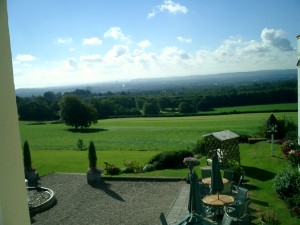
Every Day Is Magic
Each day has been a different painting by an old master. Sunday it was Monet. Tuesday it was Rembrandt. Toulouse Lautrec was there to catch a few local characters. Picasso could have been around for a late storm and sudden downpour, vanishing as quickly as it came. And now, beyond delicate rosebuds, I see newlyweds by the hotel stone fountain. Maybe Norman Rockwell even lives in Cardiff.
The hourglass Bill had on his desk. Not much sand left in it for me. I used up a lot of those grains with Bill. Wouldn’t trade them for the world.
Bill made time to dream dreams and write about ideas and people who were larger than life, perhaps larger than history.
My old friend was right about so many things, yet he may have been wrong about “one less drunk at a Welsh wake,” for now as he slumbers near the granny he loved in the ancient graveyard that has seen centuries slip by, Billy Mudd must surely be intoxicated with the magic and history that is Wales.
Home at last.
To read some of Bill’s work and life, please click here.
Note: the three poems are the property of
The Bill Meilen estate and are used with permission.



